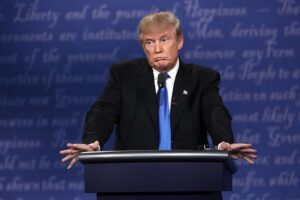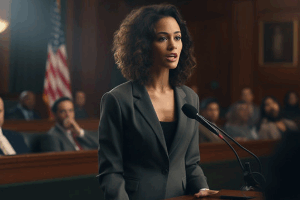
(Photo by Win McNamee/Getty Images)
On June 10, Donald Trump filed yet another motion to dismiss his Florida documents case. In this latest offering, his lawyers Todd Blanche and Chris Kise feigned gross indignation that “The prosecution team destroyed exculpatory evidence supporting one of the most basic defenses available to President Trump in response to the politically motivated charges in this case.”
Their theory is that the FBI agents who executed the search warrant on Mar-a-Lago back in 2022 spoliated evidence by failing to preserve the exact order of boxes Trump had filled with knickknacks, press clippings, golf sweaters, and stolen classified documents. And somehow this constitutes a deprivation of due process and merits dismissal of the entire case.
“The fact that the allegedly classified documents were buried in boxes and comingled [sic] with President Trump’s personal effects from his first term in office strongly supported the defense argument that he lacked knowledge and culpable criminal intent with respect to the documents at issue,” they wrote, fuming that the FBI had “failed to preserve important evidence that directly supported those defenses and instead destroyed that evidence by rummaging through the boxes in an undisciplined and undocumented fashion.”
“[T]he Office’s discovery obligations and ethical requirements have taken a back seat to President Biden’s election-interference mission,” they hyperventilated.
Last night the government responded in a tone reflecting the special counsel’s gobsmacked incredulity at a pleading which so blatantly mischaracterizes both the facts and the law.
“Defendant Trump does not offer the Court a single case at any level, at any time, from anywhere in the country, in which the disruption of the precise order of documents gathered in the execution of a search warrant provided support for a spoliation claim,” the prosecutors began, adding that “Trump personally chose to keep documents containing some of the nation’s most highly guarded secrets in cardboard boxes along with a collection of other personally chosen keepsakes of various sizes and shapes from his presidency—newspapers, thank you notes, Christmas ornaments, magazines, clothing, and photographs of himself and others,” and “now claims that the precise order of the items within the boxes when they left the White House was critical to his defense, and, what’s more, that FBI agents executing the search warrant in August 2022 should have known that.”

Why Law Firms Are Moving Beyond The Billable Hour
Explore 5 expert-backed reasons law firms are rethinking the billable hour and how legal billing software is leading the way.
They note that Trump’s vague gestures toward the Brady rule conveniently sidestep the well-developed case law on spoliation, including in the 11th Circuit. To prove that the government violated due process, Trump would have to demonstrate “exculpatory value that was apparent before the evidence was destroyed” (United States v. Revolorio-Ramo, 468 F.3d 771, 774 (11th Cir. 2006)) and bad faith (United States v. Wilchcombe, 838 F.3d 1179, 1191-92 (11th Cir. 2016)). And even if those things were established — which they are not — the likely remedy would be a curative jury instruction, not dismissal.
But speaking of bad faith …
The special counsel notes that Blanche and Kise consistently pretend in their motion that the government’s references to “location” refer to placement within boxes, rather than on the grounds of Trump’s private club. Most egregiously, they point to an email in which the FBI referred to communications with “Person 34” (generally believed to be Trump’s aide Margo Martin) about retrieving additional classified evidence she’d discovered in her desk the day after the search. Trump’s team argued that this “illustrates immediate concern about the Filter Team’s failure to follow the instructions regarding documenting the location of seized items,” an assertion clearly disproved by the FBI’s notes on the call, and the plain language of the email itself.
Similarly, Trump points to an instruction that required FBI agents to document the relative placement of privileged and classified information found within the same box as proof that the agents failed to adhere to their own rules. In reality, no such documents were found in proximity, and the instruction was never triggered.
But where the prosecutors really come out swinging is when they quote Trump’s own statements in contradiction of the claim that the precise order of documents within any box is vitally important to his defense.
“Over many months, Trump has claimed, among other things, that he deliberately declassified the documents, that the FBI planted them, and that he intentionally selected and sent the documents to Mar-a-Lago as his ‘personal records.’ These explanations have nothing to do with the precise order of items within his boxes,” the prosecutors write, adding that “Trump did not assert any argument stemming from the precise order of the documents until filing this motion in 2024, and yet he claims that its importance should have been ‘manifest’ to the FBI filter agents who conducted the search in 2022.”
Trump has publicly claimed that he telepathically declassified the documents, and even has Judge Cannon ready to instruct the jury that swiping the documents counts as transubstantiating them into personal records under the Presidential Records Act — a theory which is pretty fatally undercut by the claim that he didn’t know they were there and could have proved it if only the FBI hadn’t been so careless as to allow all the crap he stashed alongside them slosh around on the flight to DC.
And, not for nothing, but Trump himself claimed back in 2022 when he was challenging the warrant that the FBI had no right to seize anything at all that wasn’t a classified document.
“His position there—that the Constitution prohibited agents from seizing or retaining any documents not marked classified—cannot be reconciled with his current claim that the Constitution required the agents not only to seize all non-classified documents in proximity to the classified documents, but to retain them in precisely the intra-box order in which they were found,” they write, adding that “if the agents had followed the procedures that Trump claimed at the time were constitutionally required—taking only the classified documents and leaving everything else behind—there could well be no evidence of which documents were in the same box with a particular classified document, much less evidence of whether a particular document or personal effect was one inch or two inches away from a classified document.”
All of which sounds pretty convincing, but, this being Judge Cannon, she’ll probably require a two-day evidentiary hearing some time in December before ruling on it.
US v. Trump [SDFL Docket via Court Listener]
Liz Dye lives in Baltimore where she produces the Law and Chaos substack and podcast.
